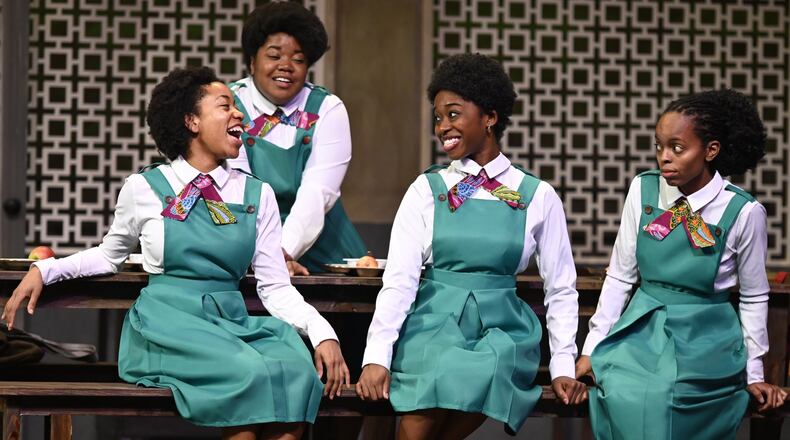There’s no shortage of laughs to enjoy in the True Colors Theatre staging of “School Girls; or, The African Mean Girls Play.” At first glance, the show seems to take its cue from American high-school movies such as “Clueless” or, yes, “Mean Girls.” But the novelty (for lack of a better word) is that playwright Jocelyn Bioh’s setting happens to be an all-girls boarding school in Ghana circa 1986, where several of the students are preparing to audition for a regional beauty pageant, vying for the ultimate title of Miss Global Universe.
The production is directed with a sure hand by notable Atlanta actress Tinashe Kajese-Bolden, whose previous directing credits on the local scene involved common themes related to race — albeit through otherwise diverse projects like the Alliance musical “Nick’s Flamingo Grill” and the Synchronicity drama “Eclipsed.” That she can now add a bona fide comedy to her directorial resume is decidedly impressive.
The meanest of the girls at the Aburi School, and the most likely to succeed in the upcoming Miss Ghana competition, is the pompous Paulina (Ellen Ifeoluwa George). By her own admission wise and beautiful and blessed, she’s also the self-appointed ringleader of a small clique of her fellow classmates, demanding their loyalty and bullying the others to keep them in line.
Her harshest criticisms are aimed at the overweight Nana (Brittany Deneen, a sweet standout in the cast). Agreeably playing the rest of the lesser defined characters in the group: Isake Akanke, Destiny Freeman and Kristen Jeter. The plot thickens with the arrival of an American transfer student, Ericka (Lauren Richards), who, unwittingly or not, threatens Paulina’s misguided sense of popularity.
Roughly running a mere 70 minutes, “School Girls” proves to be rather slight in more ways than one — generating humorous moments more efficiently than it provokes deeper thoughts, and basically raising a lot of pertinent questions that could have been better answered in a full-length, two-act play.
Besides issues of body image and body shaming mainly facilitated by the Nana character, Bioh also uses Ericka’s comparatively privileged upbringing in the States to address matters of classism, and the fact that she has lighter skin as a means to include discussions about colorism. Despite the beauty-pageant context, the playwright thankfully refrains from biting off even more than she can adequately chew by adding any mention of sexism into the mix as well.
A pretentious pageant recruiter (Valeka J. Holt), a former Miss Ghana herself, drives home most of the play’s bullet points. Bucking for a job promotion and essentially bribing Aburi’s headmistress (a spry Charity Jordan) with a financial bonus for the school of the chosen contestant, she talks about the “right aesthetic” and espouses the importance of promoting girls from “the other end of the African spectrum,” thus favoring Ericka over Paulina, who has darker skin.
Kajese-Bolden’s True Colors production is attractively designed — the lovely set is by Ming Chen, the colorful costumes by Jarrod Barnes, and Bradley Bergeron’s projections beautifully convey the passage of time in one scene; and her ensemble handles the Ghanaian accents with considerable aplomb (Ibi Owolabi is credited as the show’s dialect coach).
In the end, alas, when the school girls finally gather around a television to watch the outcome of the Miss Global Universe ceremony, their sad realization that “the world has already decided white is better than black” is largely obscured by so much of the frivolity preceding it.
THEATER REVIEW
“School Girls; or, The African Mean Girls Play”
Through March 8. 7:30 p.m. Thursdays-Saturdays; 2:30 p.m. Saturdays-Sundays; 11 a.m. Wednesdays; 10:30 a.m. Thursdays. $15-$40. Southwest Arts Center, 915 New Hope Road SW, Atlanta. 1-888-479-6300. truecolorstheatre.org.
Bottom line: Too slight to be taken very seriously.
About the Author
Keep Reading
The Latest
Featured


